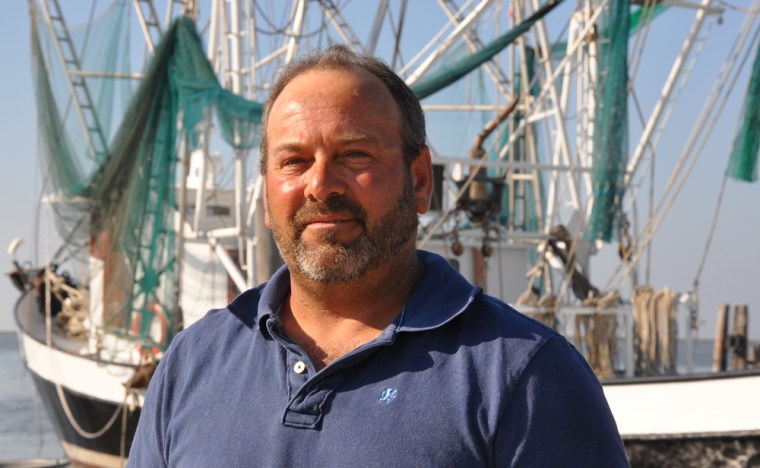The leaking oil well is capped, the oil is degrading and the coast is clear for fishermen to resume operations, but shrimper Tommy Verdin is not rushing out to sea. Like many other fishermen on the Gulf coast, he's eyeing the economic tides and worrying.
"Throughout the time we were out during this oil spill the price (of shrimp) stayed high," said Verdin. "As soon as they reopened, the price bottomed out."
When we first met Verdin on Grand Isle, La., in May, he had been forced to dock his 100-foot trawler "Cherish" amid a massive emergency response to the Deepwater Horizon oil spill. With fishing waters closed, Verdin later got a job running his boat as a "vessel of opportunity" on BP's payroll.
But with the cleanup effort waning and Gulf seafood prices in the tank, Verdin is one of many fishermen facing an uncertain future.
Gulf seafood industry promoters want fishermen like Verdin back out on the water for the sake of the whole supply chain. But the market has weakened. Some restaurants and buyers now shun Gulf seafood — despite testing that suggests it is safe — so prices have fallen to the point where many fishermen don't see a profit in going out on the water.
"The danger is that Gulf seafood could be sort of deselected by default," said Gavin Gibbons, a spokesman for the National Fisheries Institute, a trade association that represents fishermen, processors, importers and retailers of seafood. "You have a producer or processor trying to sell to a restaurant or retailer. If they can't get enough, the restaurant and retailer would remove it from the menu or their offerings. … Then they would have to fight to get back that spot on the menu."
Not surprisingly, numbers provided by the U.S. Fish and Wildlife Service show that Gulf commercial fishing declined dramatically in the January-June period compared to previous years. Shrimp production was down by every measure — number of fishermen, trips and volume of fish caught. But after a brief spike in prices before fishing areas closed, the price of shrimp has fallen ominously low.
"If we were catching the same amount we caught last year, prices would be much, much lower at the dock," said Harlon Pearce, chairman of the Louisiana Seafood Promotion Board and owner of a fin fish company. "If we had any more production at all (the price) would be dropping into the 70 (to) 80 cent range because there's no market."
Numbers are not yet available for July and August, but Pearce estimated that only about one-third of Louisiana fishermen are back out on the water.
For Laura Billiot, who has been shrimping with her husband for 40 years, the last few months have been strange. Her husband, Leonard, has been drawing a salary with BP, running their boat out of Leeville, about 10 miles from their home in Golden Meadow.
Normally their shrimp boat is parked on the canal just across the road from their home, deep in the southern Louisiana bayou.
"It's our lifestyle," she said. "It's what we love to do."
Instead, Leonard is hanging on to the oil cleanup job as long as possible.
The money has been good — about $1,700 a day for use of their boat and $300 a day wages for Leonard.
But the Billiots expect Leonard to be laid off soon, and they're uncertain if they can make ends meet by shrimping.
"Our boat holds 200 gallons, at almost $3 a gallon for fuel," Laura said. "That's right off the top. Then ice is like $11 a block … (for) four every two days. You might spend the money to go out and catch some shrimp and you don't know whether you are going to be able to sell it."
A question of trust
To get fishermen back out on the water, the seafood promotion board is calling on BP to pay a premium to fishermen at the dock— say an additional 30 cents for every dollar they get for their fish. Pearce said the "Back to the Docks" program would not only lower the risk to fishermen, but also diminish what BP would need to pay in claims later.
That effort is being discussed behind closed doors in talks between the state of Louisiana and BP, as part of a broader effort to repair the tattered Louisiana seafood brand. In an April 29 letter, state officials requested a total of $457 million from BP for a long-term safety testing program and marketing to regain public confidence. BP did not respond to a request for comment, but in August, BP spokesman Mark Proegler confirmed the company had received the request and was "in dialogue with state officials on this matter."
Pearce, who has been briefed on the talks, said that the total value being discussed now is down to about $175 million and that BP has so far rebuffed the proposal.
"Their mood wasn't good," Pearce said, referring to a meeting with BP officials before Labor Day. "They told us that they didn't think we had a branding problem at all."
Though they don't like to talk about it, even some fishermen are leery of eating Gulf seafood. Unprecedented testing of the seafood following the oil spill has shown no contamination. But debate continues in some scientific circles about the methods and transparency of the testing. Rumors fly through the fishing community when tarballs or other residue shows up on the shores.
"There is this big discussion over here," said Kirk Cheramie, a public radio station director in Golden Meadow. "What I'm hearing is that people still don't trust that the seafood is safe. They are worried that if they go catch it ... and someone gets sick, they will be liable for it."
"It's like, do you want to chance it?" Laura Billiot said of selling the shrimp she and her husband catch. "I don't know what to believe. I know we're not eating it."
